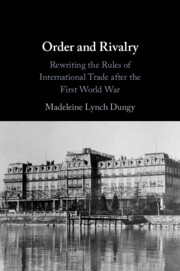Book contents
- Order and Rivalry
- Order and Rivalry
- Copyright page
- Dedication
- Contents
- Acknowledgements
- Organizational Abbreviations
- Introduction
- 1 Organizing Globalization
- 2 The World Economy at War
- 3 Planning the Peace
- 4 From Bilateral to Multilateral Trade Treaties
- 5 Studying the World Economy, from Kiel and from Geneva
- 6 European Unity and Security
- 7 The International Chamber of Commerce and the Politics of Business
- Conclusion
- Bibliography
- Index
6 - European Unity and Security
Published online by Cambridge University Press: 01 June 2023
- Order and Rivalry
- Order and Rivalry
- Copyright page
- Dedication
- Contents
- Acknowledgements
- Organizational Abbreviations
- Introduction
- 1 Organizing Globalization
- 2 The World Economy at War
- 3 Planning the Peace
- 4 From Bilateral to Multilateral Trade Treaties
- 5 Studying the World Economy, from Kiel and from Geneva
- 6 European Unity and Security
- 7 The International Chamber of Commerce and the Politics of Business
- Conclusion
- Bibliography
- Index
Summary
As Bernhard Harms pushed demanded a more global League trade policy, Lucien Coquet tried to establish firmer European substructures. Coquet embraced regional trade policy as a means to address unresolved Franco-German tensions over security. In effect, he was trying to reimpose the temporary constraints that had been placed on German commercial rights through the Treaty of Versailles by applying them to the rest of Europe as well. To advance this goal, he helped rally French politicians and business leaders in a new organization that was simply called the European Customs Union (Union Douanière Européenne, or UDE). Working in close partnership with the French Ministry of Foreign Affairs, Coquet built out national branches of the UDE across Europe. Coquet and Riedl joined forces in 1929 to promote a proposal for European federation from the French Minister of Foreign Affairs, Aristide Briand, and a parallel plan for a League-sponsored tariff truce. This marked a brief moment of unity when diverse League collaborators tried to work together to respond to the onset of the Great Depression through concerted European tariff reduction. This cooperation quickly lost momentum as the Great Depression advanced, however.
Keywords
- Type
- Chapter
- Information
- Order and RivalryRewriting the Rules of International Trade after the First World War, pp. 185 - 222Publisher: Cambridge University PressPrint publication year: 2023

